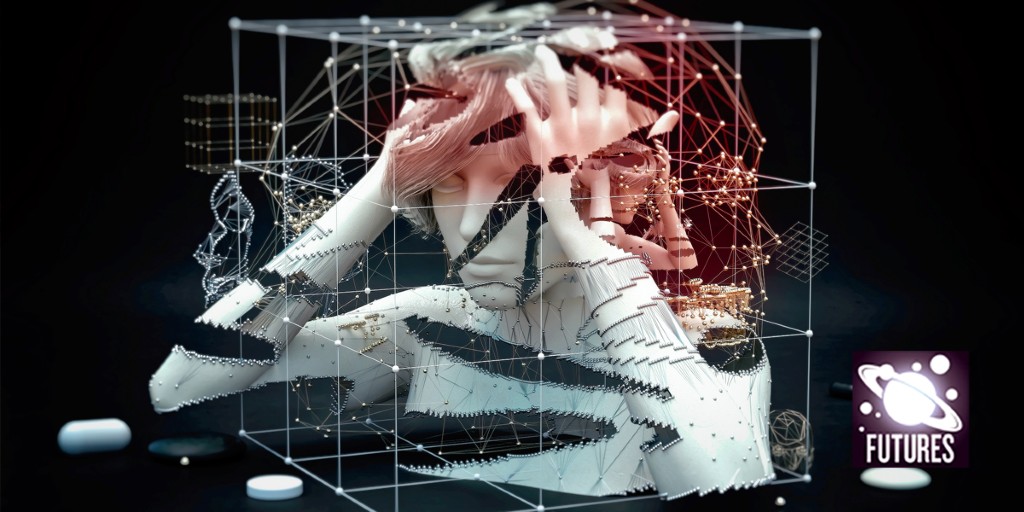A migraine pulsed through the right side of Dana’s skull as she gazed at her boyfriend Coll, her eyes half-shut against the bright lights of the ShareShare medical chamber. Coll chuckled good-naturedly as he focused on his phone. An attendant affixed sensors to his body.
“I need to show you this vid later.” Coll waggled his phone towards Dana, grinning.
“Tomorrow, maybe.” Her migraines tended to last two days, and this one had started yesterday at dawn. They’d been lucky to snag this appointment so that Coll could experience what Dana felt during an attack.
Her attendant placed a sensor on her cheek; Dana cringed. “Sorry,” the woman said. Dana couldn’t remember her name. It was a wonder she remembered her own.
“Skin hurts.” The words slurred. Molten pain pulsated from her right eye and jaw, her skin and scalp hypersensitive, her gut burbling with nausea.
“You’re set, sir,” said Coll’s attendant.
“Thanks, man.” His grin was almost as bright as the lights above. He acted like everything was fine.
Maybe for him, it would be.
Dana’s regular migraines had confounded him throughout their relationship. “But it’s just a headache,” he had told her more than once, frustrated when she had to call out of work or cancel their date nights. He had headaches sometimes, too, but he carried on.
Was she just a wimp? Maybe so. After all, when she started getting migraines at 13, her childhood doctor had also told her, “It’s just a headache.” Not a valid reason to miss school.
“You’re set up now, too,” Dana’s attendant said. “Before I initiate, I am required to remind you that you paid for a 15-minute experience. The paperwork you signed asserts that ShareShare does not treat pain, but duplicates what is felt by one person and shares that with another. ShareShare is not responsible for any duress or psychological repercussions from your time here today.”
That sounded like the bullet-point version of the ream of papers they had to sign.
“We’re good,” Coll said with a thumbs up. He’d been enthusiastic about the idea from the moment she proposed it. They’d even split the exorbitant fee. She could hardly imagine how couples managed to pay for shared hours of child labour, although that sort of intimate experience formed the core of ShareShare’s business.
Dana felt a twitch of agony unrelated to her migraine. The legalese had made it clear that some relationships didn’t survive a pain-share experience. What if Coll deemed her to be a total wimp and wanted to break up with her out of disgust?
She needed to get through the current agony, not imagine more. “I’m ready.” The sooner this was done, the sooner she could take her pain medicine.
The attendant signalled to the blatant cameras monitoring above. “We are initiating.” A digital countdown appeared on the wall. “Coll, you’ll begin to experience Dana’s migraine any moment now.”
His broad grin faltered. He pressed a hand to his right cheek. “That’s — huh.”
“Coll?” Dana leant towards him in concern. Nausea sloshed in her stomach.
He started to shake his head, then froze. “My vision. Everything is —”
“Migraines cause visual auras. I’ve mentioned it a million times?”
He pressed the heels of both hands to his forehead. For the first time in their year together, she saw unadulterated panic in his eyes. “This — oh no. This hurts.” He sounded bewildered.
Dana stared. “Well, yes?”
“Stop it,” Coll said to the two attendants, who shared an unreadable look.
“We’re only two minutes in, sir,” said the woman, “you paid for —”
“No. I’m done. This, this — oh no, I’m going to —” His cheeks bulged in a telltale way. His attendant lurched towards him with an emesis basin. Coll emptied his gut, moaning between heaves.
He had seen her do that during migraines, too. Dana frowned. “Coll, maybe try —”
“Stop the sharing,” he rasped again. He didn’t look at Dana. “I’m done.”
Suddenly, she understood. “You really believed my migraine would be nothing? That’s why you readily agreed to come to ShareShare. You thought I was, what, exaggerating all these months? Lying?”
He had curled up on the cot, eyes squinted shut. “I didn’t know. I’m sorry. Stop the pain feed, please.”
Despite the throbbing in her head, Dana knew a strange sense of rightness. “That’s OK. You can stop it.”
She had come here today, wanting Coll to validate her pain. He had, but through the process, she now understood she hadn’t needed his affirmation.
She didn’t need him.
“We’re done, too,” she said quietly.
“What?” He looked at her with bloodshot, glassy eyes.
“You never believed me. You didn’t respect me.” To think, she had feared he would want to break up with her for being a wimp. “I’d like to take my prescription now,” she added, to the attendant.
“You can go to your purse.” The woman’s demeanour was crisp and professional, but she gave Dana the tiniest of nods. That kind of validation, Dana did need.
“We can talk about this tonight,” Coll said. His attendant plucked off sensors.
“I’ll still have a migraine tonight.” She could tell by his movements that his own pain and nausea were already lifting. Dana swallowed her pill. It wouldn’t kick in for 30 minutes, and wouldn’t enable her to feel anything near normal.
But that was OK. She would feel better soon, thanks to the passage of time, thanks to her new-found freedom. Not simply freedom from an imbalanced relationship, but from the pervasive doubt she had known since she was a teenager.
This break-up was nothing compared with her migraines. Her pain was real, and so was her strength.



More News
Author Correction: Bitter taste receptor activation by cholesterol and an intracellular tastant – Nature
Audio long read: How does ChatGPT ‘think’? Psychology and neuroscience crack open AI large language models
Ozempic keeps wowing: trial data show benefits for kidney disease